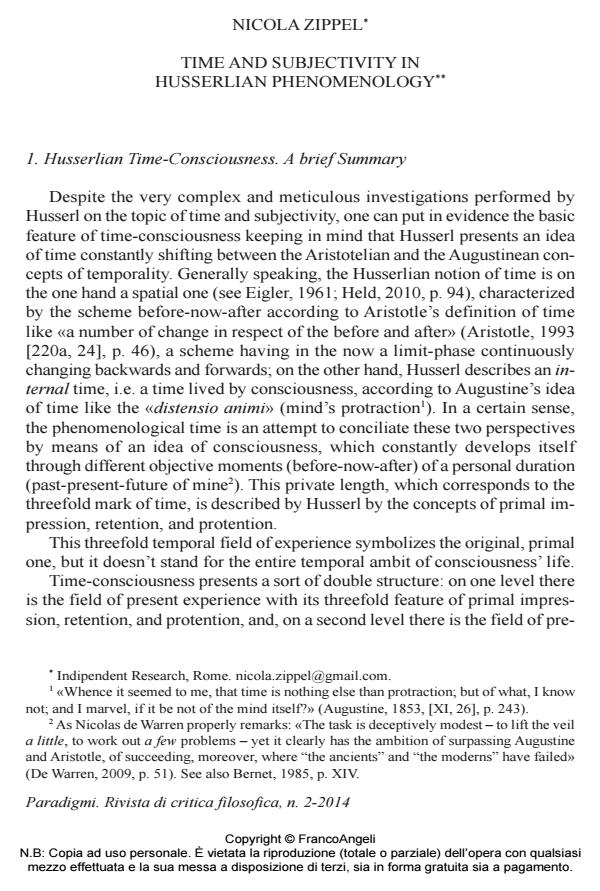Time and subjectivity in husserlian phenomenology
Titolo Rivista PARADIGMI
Autori/Curatori Nicola Zippel
Anno di pubblicazione 2014 Fascicolo 2014/2 Lingua Italiano
Numero pagine 17 P. 117-133 Dimensione file 202 KB
DOI 10.3280/PARA2014-002007
Il DOI è il codice a barre della proprietà intellettuale: per saperne di più
clicca qui
Qui sotto puoi vedere in anteprima la prima pagina di questo articolo.
Se questo articolo ti interessa, lo puoi acquistare (e scaricare in formato pdf) seguendo le facili indicazioni per acquistare il download credit. Acquista Download Credits per scaricare questo Articolo in formato PDF

FrancoAngeli è membro della Publishers International Linking Association, Inc (PILA)associazione indipendente e non profit per facilitare (attraverso i servizi tecnologici implementati da CrossRef.org) l’accesso degli studiosi ai contenuti digitali nelle pubblicazioni professionali e scientifiche
Il saggio intende illustrare le forme basilari della relazione complessa tra temporalità e soggettività nella fenomenologia di Husserl. Dopo una breve descrizione delle caratteristiche di base della coscienza del tempo descritte nelle Lezioni sul tempo, si focalizzerà l’attenzione sulla questione della soggettività assoluta delineata in alcuni passaggi del testo. Ciò consentirà di indagare più estesamente le riflessioni fondamentali elaborate da Husserl nelle sue ricerche di Bernau e nelle indagini successive condotte negli anni Trenta. Nel fare questo si analizzerà il tema della particolare temporalità dell’ego e le sue relazioni con la coscienza intesa come flusso, facendo particolarmente attenzione al ruolo giocato dalla nozione di materia (hyle). Come risultato si mostrerà che la relazione tra tempo e soggettività non è né unilaterale né uniforme, ma assume piuttosto molte figure di riferimento, a seconda dei diversi livelli di costituzione. Attraverso uno schema generale si tenterà infine di delineare le forme di base di tale relazione multiforme.;
Keywords:Fenomenologia, coscienza del tempo, soggettività, materia, temporalizzazione, costituzione.
- Aristotle (1993). Physics Book IV. Engl. transl. by E. Hussey. Oxford: Oxford University Press.
- Augustine (1853). Confessions of S. Augustine. Engl. transl. by. E.P. Pusey. Oxford: John Henry Parker.
- Bernet R. (1985). Einleitung. In: E. Husserl, Texte zur Phänomenologie des inneren Zeitbewussteins (1893-1917). Hamburg: Meiner.
- Bernet R. (2001). Einleitung der Herausgeber. In: E. Husserl, Die Bernauer Manuskripte über das Zeitbewusstsein (1917/18). Husserliana XXXIII. Hrsg. Von R. Bernet und D. Lohmar. Dordrecht: Kluwer Academic Publishers.
- Brough J.B. (2010). Notes on the Absolute Time-Constituting Flow of Consciousness. In: Lohmar D, Yamaguchi I., eds. On Time – New Contributions to the Husserlian Phenomenology of Time. Dordrecht: Springer: pp. 21-49. DOI: 10.1007/978-90-481-8766-9_
- De Warren N. (2009). Husserl and the Promise of Time. Cambridge: Cambridge University Press. DOI: 10.1017/CBO978051165741
- Eigler G. (1961). Metaphysische Voraussetzungen in Husserls Zeitanalyse. Meisenheim/Glan: Verlag Anton Hain.
- Fink E. (1966a). Vergegenwärtigung und Bild. In: Id. Studien zur Phänomenologie 1930-1939. The Hague: M. Nijhoff: 1-78.
- Fink E. (1966b). Die phänomenologische Philosophie Edmund Husserls in der gegenwärtigen Kritik, In: Id. Studien zur Phänomenologie 1930-1939. The Hague: M. Nijhoff: pp. 79-156. DOI: 10.1007/978-94-011-6422-1_
- Held K. (2010). Phenomenology of “Authentic Time” in Husserl and Heidegger. In: Lohmar D, Yamaguchi I., eds. On Time – New Contributions to the Husserlian Phenomenology of Time. Dordrecht: Springer: 91-115. DOI: 10.1007/978-90-481-8766-9_
- Husserl E. (1954). Die Krisis der europäischen Wissenschaften und die transzendentale Phänomenologie. Eine Einleitung in die phänomenologische Philosophie. Husserliana VI. Hrsg. von W. Biemel. The Hague: M. Nijhoff. (Engl. transl.: The Crisis of European Sciences and Transcendental Phenomenology, Evanston: Northwestern University Press, Evanston).
- Husserl E. (1966). Zur Phänomenologie des inneren Zeitbewußtseins (1893-1917). Husserliana X. Hrsg. von R. Boehm. The Hague: M. Nijhoff (Engl. transl.: On the Phenomenology of the Consciousness of Internal Time. Dordrecht: Kluwer Academic Publishers, 1991). DOI: 10.1007/978-94-011-3718-
- Husserl E. (1976). Ideen zu einer reinen Phänomenologie und phänomenologischen Philosophie. I. Buch. Husserliana III/1. Text der 1.-3. Auflage. Neu Hrsg. von K. Schumann. The Hague: M. Nijhoff. (Engl. transl.: Ideas Pertaining to a Pure Phenomenology and to a Phenomenological Philosophy. First Book: General Introduction to a Pure Phenomenology. Dordrecht: Kluwer Academic
- Publishers, 1982). Husserl E. (2001). Die Bernauer Manuskripte über das Zeitbewusstsein (1917/18). Husserliana XXXIII. Hrsg. von R. Bernet und D. Lohmar. Dordrecht: Kluwer Academic Publishers.
- Husserl E. (2006). Späte Texte über Zeitkonstitution (1929-1934). Die C-Manuskripte. Hrsg. von D. Lohmar. Husserliana Materialen VIII. Dordrecht: Springer.
- Plato (1894). The Parmenides of Plato. After the paging of the Clarke manuscript. With introductions, facsimiles, and notes by W.W. Waddell. Glasgow: Maclehose and Sons.
- Ricoeur P. (1950). Introduction. In: E. Husserl. Idées directrices pour une phénoménologie. Paris: Gallimard (Engl. transl.: A Key to Husserl’s Ideas I. Milwaukee: Marquette University Press, 1996).
- Rodemeyer L. (2010). A Return to Retention and Recollection: An Analysis of the Possible Mutual Influence of Consciousness and Content. In: Lohmar D, Yamaguchi I., eds. On Time – New Contributions to the Husserlian Phenomenology of Time. Dordrecht: Springer: 231-249. DOI: 10.1007/978-90-481-8766-9_1
- Sakakibara T. (2010). Reflection Upon the Living Present and the Primal Consciousness in Husserl’s Phenomenology. In: Lohmar D, Yamaguchi I., eds. On Time – New Contributions to the Husserlian Phenomenology of Time. Dordrecht: Springer: pp. 251-271. DOI: 10.1107/978-90-481-8766-9_1
Nicola Zippel, Time and subjectivity in husserlian phenomenology in "PARADIGMI" 2/2014, pp 117-133, DOI: 10.3280/PARA2014-002007